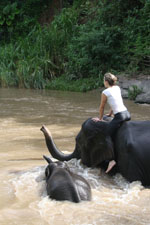Asian Elephants

Elephant Bathing
The Asian or Asiatic elephants are the largest land animal in Asia, they are highly intelligent, self-aware, extremely community-oriented and exhibit empathy and altruism. They are known to help other elephants, animals, and even humans in distress.
They have a very large neocortex, a trait they share with us, apes and certain dolphin species. Asian elephants have the greatest volume of cerebral cortex available for cognitive processing of all existing land animals, it exceeds that of any primate species, and studies place them in the category of great apes in terms of cognitive abilities for tool use and tool making.
They eat aproximately 150 kg of plants daily, drink 80–200 litres of water and use even more for bathing.
Their average life span is 60 years in the wild and 80 in captivity.
Domestication of Elephants in Asia
The first historical record of the domestication of Asian elephants was in Harappan times. Their ability to work under instruction made them very useful for carrying heavy objects. They have been used particularly for timber-carrying in jungle areas. Other than their work use, they have been used in war, in ceremonies, and for carriage. They have been used for their ability to travel over difficult terrain by hunters.
Elephants in Thai Culture

Elephant Bathing
Elephants are an important part of the Thai culture. They had an integral role in the monarchy and religion in the past.
White elephants are of a great significance in Thailand. Kings in the country have always had a herd of white elephants as a symbol of royalty. Even today white elephants are revered and considered special.
The 13th of March is Elephant Day in Thailand.
Dangers for Elephants in Thailand
Over the last few years the number of elephants in Thailand has diminished, the population has declined by at least 50% over the last three generations. The species is threatened by habitat loss, degradation and fragmentation.
During the 1970s and 1980s demand for ivory led to rampant poaching and the serious decline of elephants in many Asian and African range countries. In Thailand, the illegal trade in live elephants and ivory still flourishes. Although the quantity of worked ivory seen openly for sale has decreased substantially since 2001, Thailand still has one of the largest and most active ivory industries seen anywhere in the world.

Elephant Riding, Mae Wang, Thailand
Young elephants are captured and illegally imported from Myanmar for use in the tourism industry; calves are used mainly in amusement parks and are trained to perform various stunts for tourists, they are often subjected to a ‘breaking in’ process, which may involve being tied up, confined, starved, beaten and tortured, as many as two-thirds can die in the process.
Several projects and conservatories for these large animals have been set up all over the country to preserve them.
Our Priority is the Well-being of Elephants
If you want to interact with elephants on your trip to Thailand, but you’re concerned about doing so in a way that supports responsible tourism rest ashured that this is our priority at Next Step Thailend also.
All elephants used for riding are treated humanely and trained by expert Mahouts (elephant care takers) with many years of experience. The Mahouts have a special relationship with the elephants and have been working with the elephants for several years.

